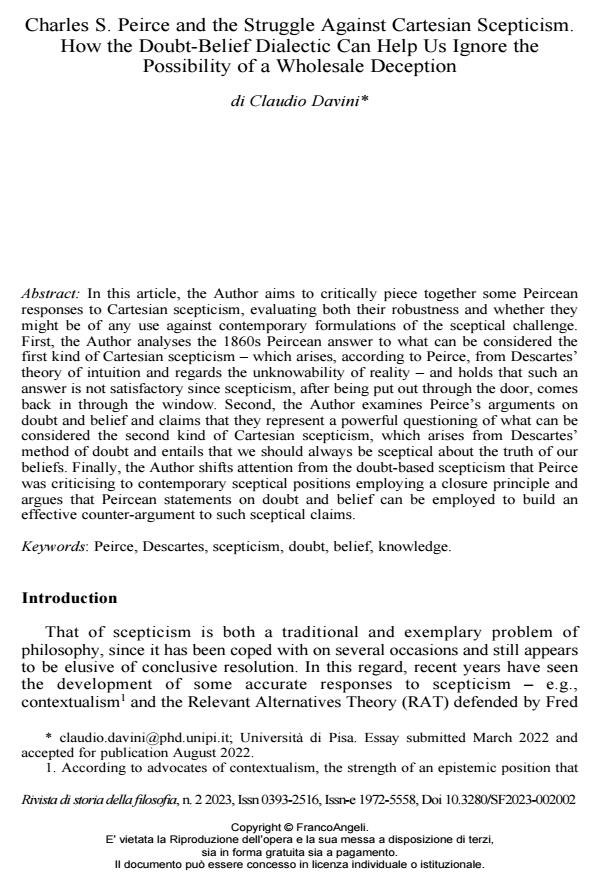Charles S. Peirce and the Struggle Against Cartesian Scepticism. How the Doubt-Belief Dialectic Can Help Us Ignore the Possibility of a Wholesale Deception
Titolo Rivista RIVISTA DI STORIA DELLA FILOSOFIA
Autori/Curatori Claudio Davini
Anno di pubblicazione 2023 Fascicolo 2023/2
Lingua Inglese Numero pagine 28 P. 213-240 Dimensione file 244 KB
DOI 10.3280/SF2023-002002
Il DOI è il codice a barre della proprietà intellettuale: per saperne di più
clicca qui
Qui sotto puoi vedere in anteprima la prima pagina di questo articolo.
Se questo articolo ti interessa, lo puoi acquistare (e scaricare in formato pdf) seguendo le facili indicazioni per acquistare il download credit. Acquista Download Credits per scaricare questo Articolo in formato PDF

FrancoAngeli è membro della Publishers International Linking Association, Inc (PILA), associazione indipendente e non profit per facilitare (attraverso i servizi tecnologici implementati da CrossRef.org) l’accesso degli studiosi ai contenuti digitali nelle pubblicazioni professionali e scientifiche.
In this article, the Author aims to critically piece together some Peircean responses to Cartesian scepticism, evaluating both their robustness and whether they might be of any use against contemporary formulations of the sceptical challenge. First, the Author analyses the 1860s Peircean answer to what can be considered the first kind of Cartesian scepticism - which arises, according to Peirce, from Descartes’ theory of intuition and regards the unknowability of reality - and holds that such an answer is not satisfactory since scepticism, after being put out through the door, comes back in through the window. Second, the Author examines Peirce’s arguments on doubt and belief and claims that they represent a powerful questioning of what can be considered the second kind of Cartesian scepticism, which arises from Descartes’ method of doubt and entails that we should always be sceptical about the truth of our beliefs. Finally, the Author shifts attention from the doubt-based scepticism that Peirce was criticising to contemporary sceptical positions employing a closure principle and argues that Peircean statements on doubt and belief can be employed to build an effective counter-argument to such sceptical claims.
Parole chiave:Peirce, Descartes, scepticism, doubt, belief, knowledge.
Claudio Davini, Charles S. Peirce and the Struggle Against Cartesian Scepticism. How the Doubt-Belief Dialectic Can Help Us Ignore the Possibility of a Wholesale Deception in "RIVISTA DI STORIA DELLA FILOSOFIA" 2/2023, pp 213-240, DOI: 10.3280/SF2023-002002